#julia bertram
Explore tagged Tumblr posts
Note
Do you think the Bertrams would change if they had a neighbor with kids around their age who insisted upon visiting them and/or socializing with them as they grew up? I will admit I am mostly thinking of this for “divert Fanny from falling in love with Edmund” reasons but also I think part of the Bertrams’ problem, at least for the girls, was just how tiny their world was. Lady Bertram refusing her duties of visiting really did a number on their social lives! The boys at least could go to school and make friends there.
It seems like Tom at least knows people in their neighborhood, he has a bunch of possible names for people to play Anhalt, so the Bertrams aren't entirely isolated. We also know that Maria, Julia, and Edmund attended balls in Northampton, where they likely interacted with their neighbours as well. This sentence implies that the Miss Bertrams were known: The Miss Bertrams were now fully established among the belles of the neighbourhood. The only person truly isolated is Fanny, who does not attend the balls or seem to have any friends.
However, I do think more socialization would have done the Bertram girls good, specifically beyond their neighbourhood where they wouldn't have been the biggest fish in the pond. I think going to London for the season regularly would have made a really big difference. Maria marries imprudently because she wants to be out in the world. She and Julia also would have already encountered men like Henry Crawford and known what they were playing at.
I would really hope that if the Bertram family interacted more beyond their circle, they would also treat Fanny better, but it's possible she would still mainly remain with Lady Bertram, limiting her chances of meeting other people.
26 notes
·
View notes
Text
The Bertram Family Album: Volume XXI
This is the last we'll see of this particular bunch of Bertrams for a little while.
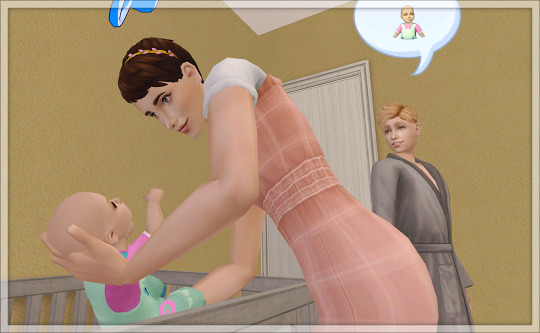
Swift on the heels of multiple family birthdays, is the safe arrival of another daughter for Julia and Crawford. They name her Deborah.

Unfortunately, Julius has to miss his first day at high school - and a chance to show off his trendy new haircut - thanks to a bout of pneumonia! (I recently installed the 'realistic sickness' mod from MATY, and had a fright from how rapidly my Sims became seriously ill, and how much care they now need in order not to keel over!)
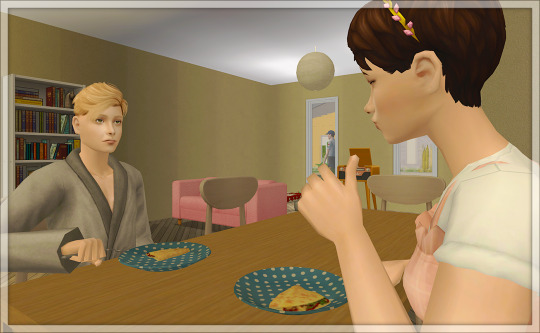
A bit of TLC from mum is what's needed.
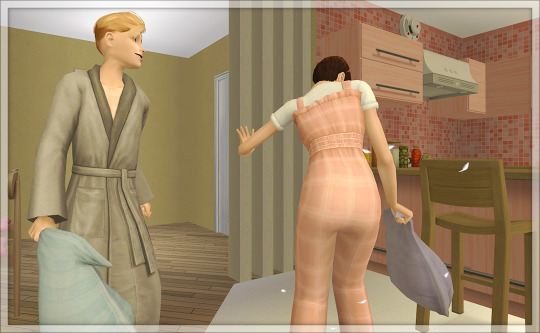

And he's soon feeling well enough to challenge her to a pillow fight...

...and preside over his baby sister's birthday.
~ Libra 4 / 4 / 6 / 5 / 2
~ Eccentric / Mean-Spirited
(Another grump!)
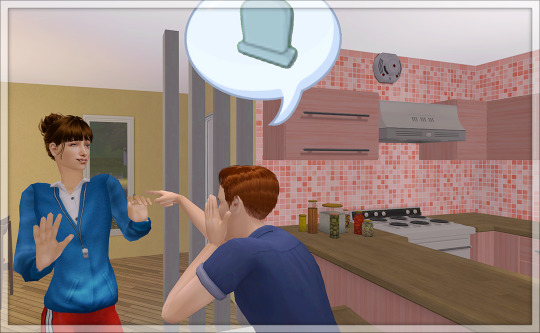
Older brother Francis likes to exercise his mean streak on a regular basis - on this occasion mocking his dad's work colleague Martha for recently losing her mother to the Grim Reaper! How low can you get?
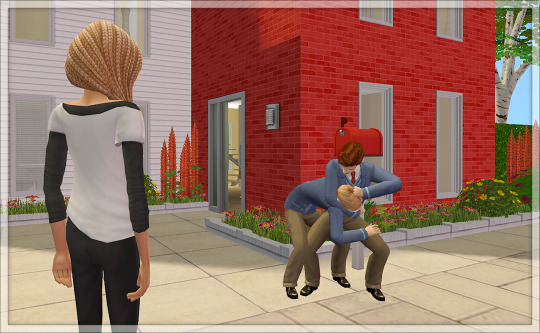

Julius is soon up and about again, and able to join his older siblings at high school, where he starts getting up to youthful hijinks with some of his fellow students, including Annemarie...

...with whom Francis seems to be rather taken.
#sims 2#gameplay#merybury#sanditon#julia bertram#crawford churchill#francis bertram#julius bertram#deborah bertram#bertram family#martha knightley#annemarie smith
17 notes
·
View notes
Text
Wretchedly did he feel, that with all the cost and care of an anxious and expensive education, he had brought up his daughters without their understanding their first duties, or his being acquainted with their character and temper.
—Jane Austen, Mansfield Park
#sir thomas bertram#jane austen#mansfield park quotes#mansfield park quote#mansfield park#sir thomas#jane austen quote#Jane Austen quotes#education quotes#education#classic books#books#classic book quote#book quotes#Julia bertram#Maria bertram#parenting quotes
46 notes
·
View notes
Text
No sooner had Susan and her cousins left their box at the intermission than they came face to face with Miss Crawford and a gentleman exiting another box a few doors down. The gentleman was a stranger to Susan but the similarity of his appearance to the lady was such as made his identity as obvious as it was unanticipated.
Julia stopped dead and even Miss Crawford, usually so self-possessed, blushed and hesitated. Her brother too seemed struck by astonishment at the sight of the party. Only Mr. Yates, whose happy disposition did not admit of any embarrassment, was unperturbed.
“Crawford!” he boomed. “This is capital! No idea you were in the country, let alone in town! It's been years! But of course we should meet at the theatre - where else? You remember my wife, of course? And this is her cousin, Miss Price. Susan, this is the famous Mr. Crawford.”
Susan was as surprised as the others but for different reasons. This was the infamous Mr. Crawford? Her cousin had ruined herself and plunged her family into disgrace for him? Why, he was such a short and slight man! Susan was on the taller side of average for her sex but she was nevertheless unaccustomed to stand eye to eye with a man in the way she was able to with Mr. Crawford. And those expressive, dark features - so elegant and pretty on his sister - were not so attractive on the gentleman. He cut an insignificant sort of figure, especially when put next to the broad bulk of Mr. Yates, who loomed over them all in his usual way. She had only met him briefly many years ago but he had seemed taller and more impressive in her memory.
What was she to say to him? She did not desire an introduction; indeed, Yates probably ought not to have done it. She could not see Julia’s expression but her silence was speech enough. Perhaps she could cut him, she could give him the cut direct and walk straight past him with her head held high and Fanny in her heart… except of course that she did not dare.
In the event, he was the first to speak. The awkwardness and evident embarrassment of his address as well as its obvious insincerity as he reacquainted himself with Mrs. Yates and professed a delight to meet Miss Price gave Susan the courage to respond with a clear and direct look, “How do you do, Mr. Crawford? But we have met before in Portsmouth five years ago; perhaps you do not recall.”
Surprise crossed his face. “I do recall our meeting. How could I forget?”
How indeed? Later, she would think of many retorts, albeit none of them suitable to be spoken aloud. Instead she found herself asking if was enjoying the play.
“With reservations,” he replied, his gaze never straying from hers. “And yourself, Miss Price?”
“Tolerably,” said Susan at the same time as Mr. Yates jumped in to inform them that this was Miss Price’s first ever visit to the theatre and how important it was that it was to such a wonderful production as The Distress’d Mother and had they ever seen anything so touching as Andromache’s tragic devotion?
“I find her a little too pious for my own taste,” interjected Miss Crawford. “I find myself drawn to Hermione and I cannot feel ashamed of it. But you have a very fine performance in Orestes for your first play, Miss Price. You have chosen well.”
Susan acknowledged that it was so and that she was very much looking forward to seeing him go mad in the final act. Yates declared there was no better actor anywhere in Europe and seemed on the point of anticipating the mad scene itself in the corridor when Julia finally roused herself to insist that the performance must be starting soon and hurried Susan back into the box, leaving the Crawfords behind to make of Mr. Yates’ paroxysms of dramatic enthusiasm what they would.
As for Susan, her spirit was disturbed by the meeting but she was determined that Mr. Crawford should not have any power over her - he had done quite enough damage by the Bertrams already for her to wish to give him any further satisfaction. Her attention should be devoted solely to the progress of the drama on stage before her. Nevertheless, it was strange to think that such a man should have been so captivating to both her cousins - he was not even handsome! And his address, well, there was nothing extraordinary about it. She could not understand it at all. And as for his view of the play, she could not help wondering over his reservations. What a very curious way to respond to her question which she had only asked out of politeness! Really, if he had reservations, he should at the least have said what they were! And so it was that at the end of several hours, when the play finally drew to a close, mad scene and all, having vowed that Mr. Crawford’s name should not even cross her mind, she found to her consternation she had thought of little else.
#the second miss price#rose writes#mansfield park#fanfiction#susan price#henry crawford#mary crawford#john yates#julia bertram
26 notes
·
View notes
Text
If you are a young woman of the early 19th century English gentry you need to get AWAY from the flirtatious young man with an estate of only £4,000 a year... if your fiancé is a bore the proper distraction is to make out with your younger sister
2 notes
·
View notes
Text
I like to think that Jane Austen would be pleased to know that me, a twenty-first century reader who has become long inured to the romantic drama that surrounds celebrities like paparazzi, still had her (likely expected) reaction to the developments surrounding Maria, Henry, and Julia.
*reads Mary’s letter alluding to some horrible rumor involving Henry and the Rushworths* 😲 😲 😲 What, was there a duel? Did Henry make a pass at Maria? Did they run away together? (no, that’s ridiculous, they wouldn’t do something that far beyond propriety...)
*reads the newspaper* Oh my gosh, they did!!! Well, at least this can’t get any worse-
*reads about Julia and Yates on their scandalously merry way to Gretna Green* 😱😱😱
This book has been a ride. And I still have two chapters to go!
11 notes
·
View notes
Text
THAT’s the screen adaptation of Mr. Yates !!??
Not at all what I imagined- I take it all back- get um Julia
“Mr Darcy this-“
“Mr Knightley that-“
WHAT ABOUT MY COMPLETELY IRRELEVANT BOY MR YATES FROM MANSFIELD PARK?! 💕💕💕


1. He’s a playwright who is determined to get his smutty work on stage. I’m all for that. 🥰😳
2. He’s a giggly babygirl who has fluffy blond hair. I want to tickle his sideburns and feed him quail’s eggs. 😩🤭
3. Esfp bachelor. Like yes! Be a confident failure, I’ll produce Lover’s Vows! I’ll marry you even if you have nothing but ink to your name! 🥹😘
3. He has a horsey 🐴
(I wrote this at like 1:20 am, I’m horny af. I’m so sorry-)
67 notes
·
View notes
Text

Fandom: Blandings Castle
Sample Size: 41 stories
Source: AO3
#constance keeble#rupert baxter#lord emsworth#clarence earl of emsworth#galahad threepwood#the empress#empress of blandings#julia fish#reginald jeeves#bertie wooster#bertram wooster#blandings castle#fanfiction#ao3#statistics#phantom statistician
10 notes
·
View notes
Text
why I never get significant amounts of writing done, or, a liveblog of my last three hours working on a Mansfield Park fanfic:
Trying to figure out Yates' family for Julia-meets-her-in-laws purposes:
-> he's "the younger son of a lord with a tolerable independence" (MP XIII)
And now I'm down a rabbit hole trying to figure out what Austen means when she says 'a lord'. If she meant an Earl/Viscount/Baron, she surely would have specified "the younger son of a[n] Earl/Viscount/Baron with a tolerable independence." The Law Lords come in too late for that to be applicable.
...The younger sons of Dukes and Marquesses were styled as "lord ---" so Yates could conceivably be the younger son of a younger son. It might be that it's the lord (Yates' father), and not Yates, who has a tolerable independence from his father/our Yates' grandfather. But Dukes and Marquesses seem too aristocratic for Austen's taste: she never seems to aim beyond Earls (Lord Ravenshaw, Colonel Fitzwilliam's father.) Besides, Yates has an estate of his own (MP XLVIII)
[side note- estate as in "area of land"; estate as in "all money and property [he] owned" in general; or estate as in "condition in life?"
"there was comfort in finding his estate rather more, and his debts much less, than [Sir Thomas] had feared" (MP XLVIII). "rather more" seems to fit best with money and property in general: condition would surely be "...his estate rather better." And an area of land might be found to be "[worth] rather more", but just finding it to be bigger in general doesn't mean anything. Like, an extra acre of farmland is one thing, but an extra acre of fetid swamp water isn't gonna generate much income. Besides, younger sons not having their own land is Kind Of A Thing in MP, and Julia's visit to some of Sir Thomas' relatives is attributed to "some view of convenience on Mr. Yates' account" (MP XLVII). "The cousins...live near Bedford Square" (MP XLV), a very fashionable address, and as Yates is described as fashionable and expensive (MP XIII), it seems feasible that Yates has a permanent residence in London, also near Bedford Square...?
And then again, 'Lord' may have been perfectly common parlance for Earl/Viscount/Baron when the specificity of the rank either doesn't matter, or would have been obvious to Austen's original readers thanks to context clues I've missed entirely. The lack of specificity could be deliberate, drawing attention to how little the family at Mansfield Park actually know about Yates. I assume that Yates' father is alive because otherwise why frame him as "younger son" instead of "younger brother"?
....*shakes Jane Austen* you could tell your relations that Mrs Norris' "great sum" she gave William was £1 but you couldn't give them a detailed Yates family tree???
...and then it finally occurred to me to just google "what is a Baron", at which point the OED tells me:
noun
1.a member of the lowest order of the British nobility. Baron is not used as a form of address, barons usually being referred to as ‘Lord’.
So, we learn two things: 1) Yates' father is a Baron [I'm 99% sure] , and 2) I make life far more complicated for myself than it needs to be.
Progress made: plausible existence of Baron Dad Yates (still alive) established. At least 1 brother (older) confirmed. Biologically speaking, can assume a mother also existed or exists.
Words Written: Big Fat 0
...now repeat a similar process for every even semi-significant detail. Like trying to decide whether Bedford Square itself was fashionable enough for Yates (no, but Grovsenor Square or nearby to Grovesnor Square, about 25 minutes away probably would be...)
#John Yates#Mansfield Park#my fic (sort of)#we know that Yates doesn't think much of parental claims#I'm imagining his father as Mr Woodhouse-esque and his mother as very Mrs Jennings-like.#Julia Bertram is going to get at least one parental figure who will hug her if I have to make them up myself#Firmly on team Yates and Julia making a strong go of it and being very happy
2 notes
·
View notes
Note
I was wondering — how do you think Mansfield would turn out if Henry had fallen in love with Julia and married her? Because a lot of the other dominoes would not have fallen.
Part of the question is when he falls in love with Julia and if she decides to accept him. Julia finally figured out that Henry was playing a double game during the play, after that she is very resistant to him flirting with her. She even arranges to stay with friends when he goes to London (smart girl!) so she won't have to see him.
If Henry arrives and falls for Julia, he wouldn't flirt with Maria and the story would be very boring, though I think Maria would get very jealous of her sister's good luck while she's stuck with her loser fiance. Sir Thomas would also be happy.
If Henry falls in love sometime around Sotherton, Maria is going to be angry and probably attempt to win Henry back. That would cause further discord between the sisters and jealousy in Mr. Rushworth. The play would be a lovely mess, because Maria would want to play opposite Henry but he would push for Julia. That probably leaves Maria moping on the sidelines.
If Henry falls post-play, then it would be an uphill battle to convince Julia that his feelings were real. I don't think she'd hold out as well as Fanny Price, however, and would absolutely accept a proposal. Maria would be furious. I can see Julia returning home as quickly as possible to escape her wrath. Then all Henry needs to do is NOT flirt with Maria again, which would probably be fine if he followed Julia back to Mansfield.
However, all of this would leave Edmund very likely to end up with Mary Crawford, which leaves Fanny behind. I do think either Maria or Julia would end up inviting her over to keep them company. And no, I don't think Henry is immoral enough to try to seduce a house guest and relative of his wife. Mary Crawford also likes Fanny and I can see her trying to match-make after she marries Edmund. Might even use Fanny as a good excuse to go enjoy the season in London!
#mansfield park#question response#that was a fun what if!#though I don't think Henry would fall for Julia ever#He's met too many women like her#henry crawford#julia bertram#what ifs
31 notes
·
View notes
Text
The Bertram Family Album: Volume XX
Having a very strange time at the moment, and haven't had the time or energy for my Sims, but I'm trying to get back on track. Back to the Bertrams again today, where kids are sprouting up all over.

It's a quiet Sunday morning at home, and Julius makes the most of his last day for bouncing on the bed, before his birthday later!
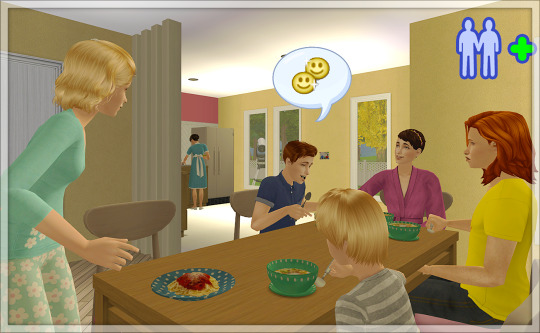
A leisurely family breakfast...of spaghetti, for Eccentric Francesca.
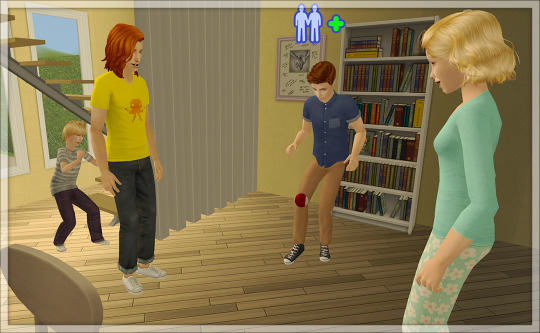
And a family game of kicky bag, to round off the morning.
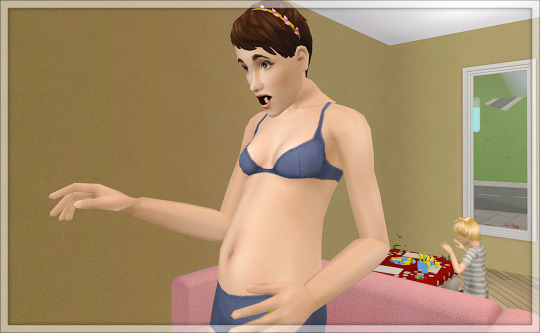
Well, that will be why Julia's cereal was making her feel a bit queasy earlier on!
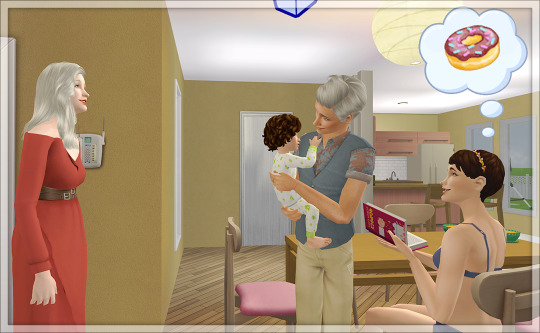
Extended family drop in, to celebrate with the two birthday boys. Julia clearly didn't feel like dressing for the occasion. (And is having prenatal doughnut cravings, it seems.)
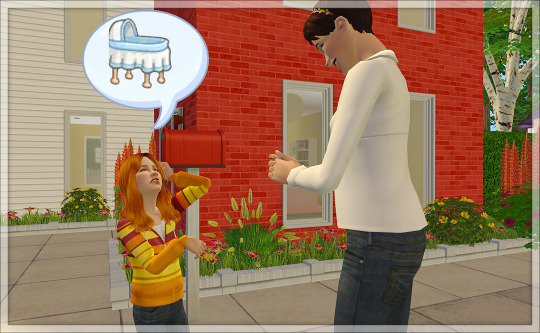
At least she put on some clothes to go outside, and explain the facts of life to her slightly perplexed nephew Marcus.

Crawford prefers to spy on his neighbours in his bath towel. Eccentric, or misunderstood genius? I'll let you decide.
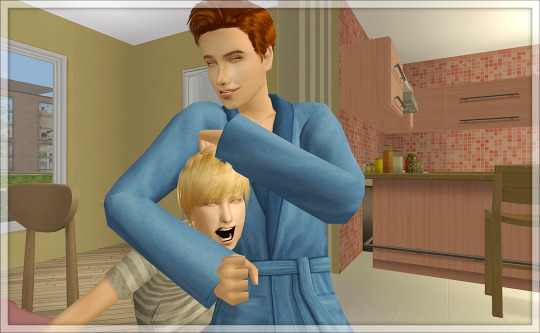
One last noogie from big brother Francis...

...and Julius's teen transformation is complete.
~ Aries 6 / 3 / 5 / 5 / 2
~ Shy / Anxious / Loves the Outdoors / Hot-Headed
~ OTH: Tinkering
~ Favourite Colour(s): Grey
~ Aspiration: Knowledge
~ Turn-ons / -off: +Alien / +Reserved / -Supernatural

It's youngest Timothy's birthday too.
~ Taurus 10 / 8 / 10 / 7 / 10
~ Eccentric / Friendly / Adventurous
~ OTH: Arts & Crafts
~ Favourite Colour(s): Blue
Alone amongst his siblings, he continues to be a cheery, creative little soul, with an Adventurous streak too!
#sims 2#gameplay#merybury#sanditon#julia bertram#crawford churchill#francesca bertram#francis bertram#julius bertram#timothy bertram#marcus churchill#bertram family
16 notes
·
View notes
Text
I just had a brainwave about Mansfield Park. This might be something that Jane Austen fans already know and think is obvious, but I've never heard it discussed, and I think it really clears up a lot of things about this book for me.
So scholars are always talking about how this book intersects with slavery. First of all, the Antigua property that isn't doing so well would have been worked by enslaved people (keeping slaves was still legal in Antigua, though selling them there was not). Also, at one point Fanny asks Sir Thomas a question about the slave trade, though it isn't really elaborated on. I saw this discussed again and again in the (admittedly little) scholarship I read on this book, and it always seemed weird to me that they zeroed in on that detail.
More recently, I read Margaret Doody's book on the names Austen used in her work, and she pointed out that the famous legal case that declared slavery to be illegal in England was called the Mansfield Decision. Any reader at the time, reading that novel, would have that information in the back of their head, and it would have informed how they read the book.
This much I knew. But I always felt like these arguments never really explained what slavery had to do with the love story of Fanny Price: even Doody never seemed to connect this factoid about the title very deeply with the novel's themes (a problem I had with a number of her discussions in that book).
More recently, I saw it pointed out that Fanny Price is treated like a slave by Mrs. Norris, and I thought, "Aha! Finally, an explanation!" But it still didn't feel complete to me.
But I just realized: you can take that metaphor a lot farther. (For this argument, please keep in mind that Austen, though on the side of the abolitionists, was a 19th-century woman who didn't have the same sensibilities about the discussion of race as we do now.)
--Like an enslaved person, Fanny is taken from her home and her family and moved far, far away (she isn't kidnapped, of course, but stick with me).
--The family that she joins considers her to be naturally stupider than they are because she has not had the advantage of their education. This is similar to African slaves, whom white people looked down on and thought intellectually inferior because they didn't have a western education.
--The term "family" at the time included the household servants and slaves, not just the actual family. Fanny, the poor relation, joins the household less like a cousin/niece, and more like a servant or an enslaved person. She is literally relegated to sleep in an attic, like a maid.
--Fanny suffers a great deal emotionally because she misses her family (especially Edward). Austen, as an abolitionist, would likely have read accounts like Olaudah Equiano's autobiography, which often described the intense emotional suffering of enslaved people separated from their homes and families.
--One of the justifications slaveholders gave for slavery was that they were "improving" the lives of the Africans they enslaved, by teaching them Christianity and occasionally, trades or other forms of education. Fanny is ostensibly being brought to Mansfield to give her a good education. And while she does get that education, she really functions much more in the household like a servant to Lady Bertram and Mrs. Norris.
--Fanny IS taught a great deal of morality by Edmund, who is a bit of a prig. It seems hypocritical of him to be constantly "schooling" her in morality when it often seems like Fanny is more naturally ethical than he is. This mirrors the hypocrisy of white slaveholders who deigned to teach their slaves Christianity while acting extremely unchristian themselves.
--Fanny ends up with an inferiority complex because she is constantly torn down by Mrs. Norris and treated as inferior by Maria and Julia. In reality, she's very intelligent, well-read, and ethical in a way that none of them area. This mirrors the way black folks were unfairly treated as inferior by white society.
--The injustice of the Bertrams toward Fanny is so obvious to outsiders that even the morally deficient Crawfords are indignant about it. Mrs. Norris makes a snide remark to Fanny about "who and what she is" (a reference to racism?) and Mary Crawford is indignant on Fanny's behalf and rushes in to comfort her. Henry Crawford--at least, after he falls in love with Fanny--says that the way the family has treated her is disgraceful, and that he is going to show them how they should have been treating her all along. Austen may be pointing to the idea that slavery is SO wrong that it should be obvious to everybody.
I conclude that the book is titled Mansfield Park because Austen wants to point out that while slavery may be illegal in England, poor relations are still often treated like slaves by their families.
That being said, here are some questions this analogy throws up:
--Why is Sir Thomas so much nicer to Fanny after his stay in Antigua, where he would have been witnessing slavery on a daily basis? What does this say about him, both as an uncle and a slaveowner?
--Fanny goes home to Portsmouth, and finds that she doesn't like it and it isn't as neat and orderly as she would like. Is this Austen saying that if enslaved people went back to Africa, they would find that they still felt western society to be superior? How would we square that idea with the point above that westerners are not superior to Africans?
--Why does Fanny end up with Edmund? If he's analogous to the son of a slaveowner and she's analogous to a slave, why is she in love with him in the first place, and why does Austen seem to reify her choice by making them get together in the end? (Remember that even Austen's sister Cassandra felt strongly that Fanny should have ended up with Henry Crawford, not the priggish Edmund.) Is Fanny brainwashed by the Bertrams? How does that relate to the slaveholding analogy?
#jane austen#mansfield park#literature#literary analysis#these were Bedtime Thoughts#so sorry if some of them don't make sense lol
98 notes
·
View notes
Text
Inspired by @kajaono's post the other day about Victoria Hamilton, JLM and Austen adaptations, have a list of the actors that have been in at least 2 Austen adaptations:
Hat trickers:
Victoria Hamilton played Henrietta Musgrove in Persuasion (1995), Julia Bertram in Mansfield Park (1999), and Mrs. Foster in Pride and Prejudice (1995)
Johnny Lee Miller played one of Fanny's brothers in Mansfield Park (1983), Edmund Bertram in Mansfield Park (1999), and Mr. Knightley in Emma (2009).
Doubles:
Joanna David played Elinor Dashwood in Sense and Sensibility 1972; she also played Mrs. Gardiner in Pride and Prejudice (1995)
Samantha Bond played Maria Bertram in Mansfield Park (1983); she later on played Mrs. Weston in Emma (ITV, 1996)
Bernard Hepton played Sir Thomas Bertram in Mansfield Park (1983); he later on played Mr. Woodhouse in Emma (ITV, 1996)
Sylvestra Latouzel played Fanny Price in Mansfield Park (1983); she later on played Mrs. Allen in Northanger Abbey (2007)
Nicholas Farrell played Edmund Bertram in Mansfield Park (1983); he later on played Mr. Musgrove in Persuasion (2007)
Irene Richard played Charlotte Lucas in Pride and Prejudice (1980); she then played Elinor Dashwood in Sense and Sensibility (1981)
Robert Hardy played General Tilney in Northanger Abbey (1987); he later on played Sir John Middleton in Sense and Sensibility (1995)
Sophie Thompson played Mary Musgrove in Persuasion (1995), and then the following year she played Miss Bates in Emma (Miramax, 1996)
Kate Beckinsale played Emma Woodhouse in Emma (1996); later on she played Lady Susan in Love and Friendship (2016)
Blake Ritson played Edmund Bertram in Mansfield Park (2007) and later on Mr. Elton in Emma (2009)
Jemma Redgrave played Lady Bertram in Mansfield Park (2007); she later on played Mrs. DeCourcy in Love and Friendship (2016)
Lucy Robinson played Mrs. Hurst in Pride and Prejudice (1995); the following year she played Mrs. Elton in Emma (ITV, 1996)
Carey Mulligan played Kitty Bennet in Pride & Prejudice (2005) and then Isabella Thorpe in Northanger Abbey (2007)
Lucy Briers played Mary Bennet in Pride and Prejudice (1995); she also played a minor role as Mrs. Reynolds in Emma (2020)
If we include Austen-adjacent pieces:
Hat tricks:
Hugh Bonneville played Mr. Rushworth in Mansfield Park (1999) and later on played Rev. Brook Bridges in Miss Austen Regrets (2007) and then Mr. Bennet in Lost in Austen (2008)
Doubles:
Olivia Williams played Jane Fairfax in Emma (ITV, 1996); she later on played Jane Austen in Miss Austen Regrets (2007)
Also, Greta Scacchi played Mrs. Weston in Emma (Miramax, 1996) and went on to play Cassandra Austen in Miss Austen Regrets (2007)
Guy Henry played John Knightley in Emma (ITV, 1996), and later on played Mr. Collins in Lost in Austen (2008)
Christina Cole played Caroline Bingley in Lost in Austen (2008) and then Mrs. Elton in Emma (2009)
Anna Maxwell Martin played Cassandra Austen in Becoming Jane (2009), and then went on to play Elizabeth Bennet in Death Comes to Pemberley (2014)
JJ Feild played Mr. Tilney in Northanger Abbey (2007) and later on played Mr. Nobley in Austenland (2014)
If we include radiodramas/radioplays:
Hat tricks:
Blake Ritson gets it as he played Colonel Brandon in the 2010 S&S radio drama
Doubles:
Amanda Root played Anne Elliot in Persuasion (1995); she also played Fanny Price in the 1997 radio drama for Mansfield Park
Felicity Jones also played Fanny in the 2003 radio drama for Mansfield Park, and later on played Catherine Morland in Northanger Abbey (2007)
Robert Glenister played Captain Harville in Persuasion (1995); he also played Edmund Bertram in the 1997 radio drama for Mansfield Park
Amanda Hale played Mary Musgrove in Persuasion (2007) and later on Elinor Dashwood in the 2010 radio drama for Sense and Sensibility.
David Bamber played Mr. Collins in Pride and Prejudice (1995); he later on played Mr. Elton in the 2000 radio drama for Emma
Robert Bathurst played Mr. Knightley in the same adaptation of Emma; later on he played Mr. Weston in Emma (2009)
Also in that adaptation, Tom Hollander played Frank Churchill; he later on played Mr. Collins in Pride & Prejudice (2005)
Juliet Stevenson played Anne Elliot in the 1986 radio drama for Persuasion; later on she played Mrs. Elton in Emma (Miramax, 1996)
And I'm very likely still forgetting someone.
64 notes
·
View notes
Text
"Best" is left up to interpretation
#19th century literature#jane austen#persuasion#sense and sensibility#northanger abbey#mansfield park
47 notes
·
View notes
Text

Berenice Abbott at 18 rue Servandoni
The portrait on the cover of Julia Van Haaften's 2018 biography "Berenice Abbott: A Life in Photography" and at the top of Abbott's wiki page is by an unknown photographer. It was taken for the small newspaper Paris-Midi, published June 14, 1928. Keystone France agency, and now Getty owns the rights and incorrectly dates it as 1927, while Wikipedia dates it as "1930s."
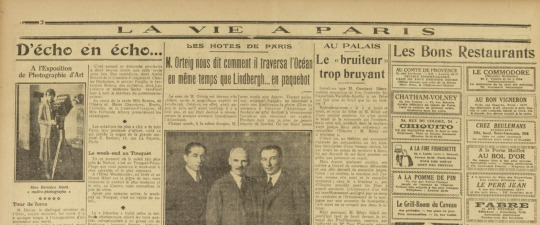
At the time, her studio was at 18 rue Servandoni in Paris, we see the fireplace and door in the background in other portraits, such as the portrait of James Joyce's daughter, Lucia. There's a classic Atget at 15 rue Servandoni, but it's from 1903-4. Atget died in 1927 and Abbott, along with Julien Levy, saved his archive. By 1930 she was in New York City, where Walker Evans made his great portrait of her.
Van Haaften writes that in search of lower rent, Abbott moved to the rue Servandoni studio in early 1928. Abbott kept a clipping of the newspaper, but there's no further detail about the portrait session in the biography.
I was curious about the photographer of the portrait and found Getty has a handful of other frames from the same session that I'd never seen.

Most interesting of those frames is this contemplative shot showing the windows of her studio, maybe some photo chemicals on the table. A puff of smoke emanates from Abbott's cigarette in the same place where someone has left their fingerprint on the negative or print. There's a strong reflection or light leak in the top left corner of the frame. Van Haaften describes the rue Servandoni studio offering "beautiful north light."
Looking at the building on Google Earth, there is one north-facing spot that has the large windows similar to the 1928 portrait, seen in the center of the screen grab below.

Another detail Van Haaften mentions is that it took Abbott months to install electricity. An electric spotlight is on a tripod behind Abbott in the standing portrait. In the alternate angle you can see a not-to-code wire dangling.

So, who made these portraits? The Keystone France agency was an off-shoot of a popular stereoview company based in Meadville, Pennsylvania, hence "keystone." If you've ever flipped through old stereoviews at a vintage shop, you recognize this brand. The French agency was founded by Alexandre Garai in 1927 (whose brother Bertram started a related Keystone in London in 1914). The Met has one photograph by Alexandre Garai, taken in 1927. The jpeg is tiny, but indicates a modern perspective. While it's possible Garai is the photographer, his brother's ethos seems to have been to be the boss ... and never touch a camera.
The identity could be buried deep in Getty's London warehouse, which stores 80 million photographs and negatives. When these frames were scanned and metadata added to Getty in 2010-2016, if there was a name on the back of the prints, it probably would have been added then.
From the photos themselves, it's difficult to say if Abbott had a rapport or was familiar with the photographer: her default intensity is remarkably consistent her entire life, up until the last portrait of her in 1991.


(left, rue Servandoni 1929, right: Hank O'Neal, Berenice Abbott, Last Portrait, Monson, Maine July 17, 1991)
From the resolution, the depth of field on the lens, these are probably shot with a 4x5 or larger camera. It looks like the photographer shot the lens wide open, the camera in the standing portraits looks very much in focus, while Abbott's face looks slightly out of focus.
Two of the four frames have similar damage, could be a development problem, but could be mold later while in storage. Abbott's Paris portraits of the period were shot on glass (as much of Atget's body of work was), though by the late 1920s glass plates had mostly been replaced by film. Annoyingly, Getty is one of the best places online to see her Paris portraits, but the Steidl book is highly recommended. Seen together, you realize why Man Ray felt threatened, or at least annoyed, by his former assistant.
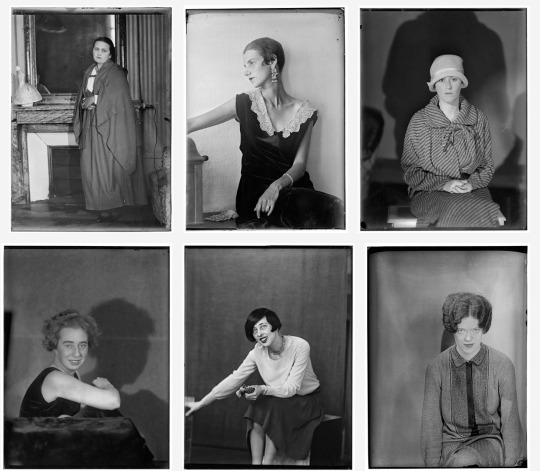
The photographer was either challenged or in a challenging environment. Abbott was often a withering critic, one can imagine a green photographer shows up to make portraits and encounters a prickly subject. With the seated portrait above, at first glance, I thought maybe the print has a piece torn out of the left side? Or is it a modern lamp intruding on the composition?
It's difficult to tell with the window portrait how much of it is a metering mistake or the potential development issue, but it looks several stops overexposed to be of use in publication of that time. Today, with our phone cameras taking three frames and digitally merging exposure, we can romanticize the top half of her body dissolving into the light is as the "magic of film."

I'm calling this the "last" frame of the session, based only on the fact that her pose and facial expression has shifted from intensity to a mix of boredom and exasperation. The photographer told her to sit on the day bed with tea and a book, "look relaxed," but she wants nothing to do with it.
32 notes
·
View notes
Text
Austen siblings: the worst of the worst
Please vote based on their depiction in the books, not the movies. Other than that, use whatever criteria you want. Most toxic? Least well-suited to each other? Most well-suited to being awful together? Most annoying? Least realistic? Up to you!
These are in alphabetical order by last name, so read the whole list before voting!
I have a best Austen siblings poll too.
#yes the crawfords are on both the best and worst polls#and i expect will get votes on both#jane austen characters#jane austen#siblings#polls
78 notes
·
View notes